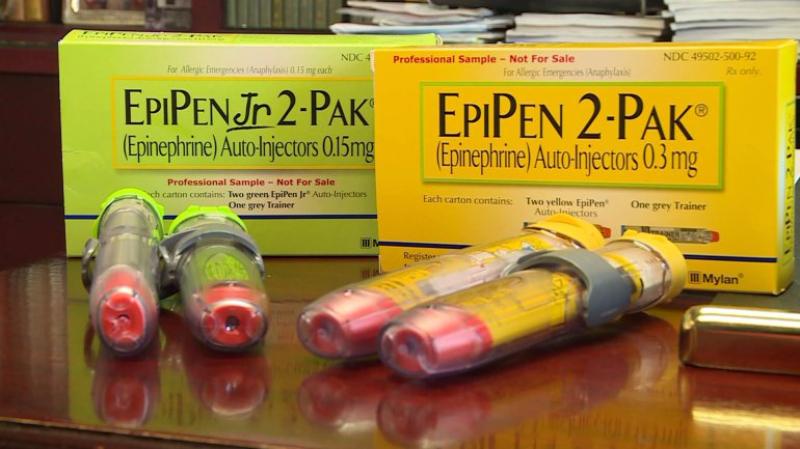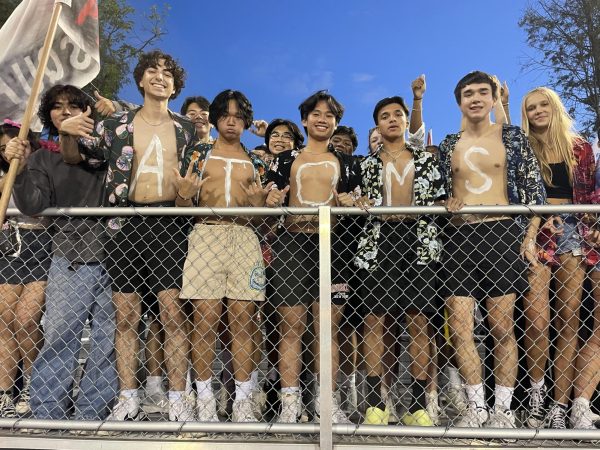Lower the price of EpiPens
The epinephrine autoinjector market turns into a monopoly
Every time junior Elizabeth Corcoran attends an event, she has to double check that nothing has been contaminated with peanuts.
This inspection extends to aspects beyond just food, including utensils and tables.
However, Corcoran is not alone. According to Food Allergy Research and Education (FARE), roughly two students in every classroom across the country is impacted by a food allergen which includes: milk, eggs, peanuts, tree nuts, soy, wheat, fish and shellfish.
However, Corcoran was shocked to find out the large increase in the price of EpiPens. She’s not alone, in FCPS alone, 12 percent of all students identified to having a food allergy.
The deadly reaction called anaphylaxis may trigger a person’s body to turn blue, breakout in hives, obstruct swelling in the lips, tongue, throat and drop in blood pressure.
In case of a severe reaction, families and schools are equipped with epinephrine autoinjectors, more commonly known as EpiPens.
These injectors contain a rapid dose of adrenaline, which is the first line of defense used against the reaction before the patient gets rushed to emergency services.
However, these injectors are not cheap, and due to increased prices over the years, the lives of millions are in danger.
The culprit is Mylan, the pharmaceutical company that has dominated the EpiPen market, has come under fire for the striking price hikes of the rapid dose of epinephrine.
According to CNN, EpiPen’s price has been hiked 15 times since 2009. The price of two epipens costed $124 in 2009, now the same package is sold at $609. This is a staggering 400 percent price increase.
This is extremely unsettling, as an Epipen only actually contains $1 of medication. EpiPens also have a short expiration date; every single injector needs to be replaced after only one year.
Many families keep several injectors around their homes and now simply do not have the money to keep paying for such expensive medicine.
Some have even resorted into creating their own injectors, which can be potentially dangerous and unsanitary as well.
“”Whenever I go out, I will have one with me. I’m able to self-carry so I have one in my backpack at school at all times,” said Corcoran, “I have two more at my house.””
According to The Washington Post, Mylan has been able to get away with unbelievable prices due to the fact that the company adds a nine to 15 percent price increase each time and insurance companies often made up for the difference.
It definitely is not fair for those impacted by food allergens to pay skyrocketing prices for such a small dosage of medicine.
People should not have to choose between buying or not buying something can determine life or death.
It also does not help that Mylan is one of the only companies in the country that produces epinephrine autoinjectors.
Sanofi’s Auvi-Q, a previous competitor, had their products recalled due to inquiries on whether the devices were delivering the correct amount of epinephrine.
Another company, called Adamis Pharmaceuticals is currently on hold with the FDA as the agency is conducting further inspections on the product.
As of now, only a generic brand, called Adrenaclick, is on the market with Mylan’s EpiPen.
Thankfully, Adrenaclick is much more affordable, retailing at a price of $142.
However, according to the Washington Post, doctors are reluctant to prescribe Adrenaclick as the instructions for injecting the Adrenaclick is very different from the EpiPen, and most people are trained on the EpiPen.
Mylan not only has power in the economic field, but also in politics as well. In 2010, the company, with a recommendation from the FDA, successfully lobbied for EpiPens to be sold in pairs. The argument for the legislation was that a second injector would be there in case the first one malfunctioned.
The legislation would also make EpiPens available in public areas like defibrillators.
Mylan has tried to offer coupons to its consumers, but they are simply useless. These discounts are only applicable to a very small number of people, which does not include people on Medicaid.
With competitors out of sight and successful lobbying on Capitol Hill, Mylan has brought in some serious money.
The CEO of the company earned $19 million just last year. This is concerning as the events have encouraged the conclusion that this market is turning monopolistic.
Fortunately, Congress has shown concern over the company due to the recent price hike which occurred right before back to school season.
Twenty Democratic senators, including Elizabeth Warren, have addressed a letter of concern to Mylan’s CEO.
The senators are demanding answers and investigation as to why the prices have been so high.
The senators have made a step in the right direction as it is unacceptable for a company to completely dominate a market and take advantage of the public with a medicine of such importance.
Along with political trouble, Mylan is currently under investigation for possibly violating the antitrsut law.
As September arrives, schools everywhere have to restock on their own bulk of EpiPens, which can be incredibly costly. Since 2012, Mylan has implemented a program that has allowed schools to purchase EpiPens at a discounted price, but only if they agree to certain terms in a contract.
The agreement by Mylan that would allow schools to purchase autoinjectors at a price of $112.10, only if the schools agrees that it will not purchase from any other company. This act is prohibited by federal law, as it decreases the amount of competition there is on the market.
Hopefully, there will be some positive changes in the autoinjector market after pressure from lawmakers and consumers alike.
In conclusion, all affected by allergens should be able to live their lives knowing that if accidents do occur, they can have a backup before they reach the emergency room.
At the same time, families should not be paying outrageous prices for these crucial backups.

Senior Binqi Chen is the current Co Editor-in-Chief of The A-Blast. She has been on staff for four years and previously served as the In-Depth Editor as...
















